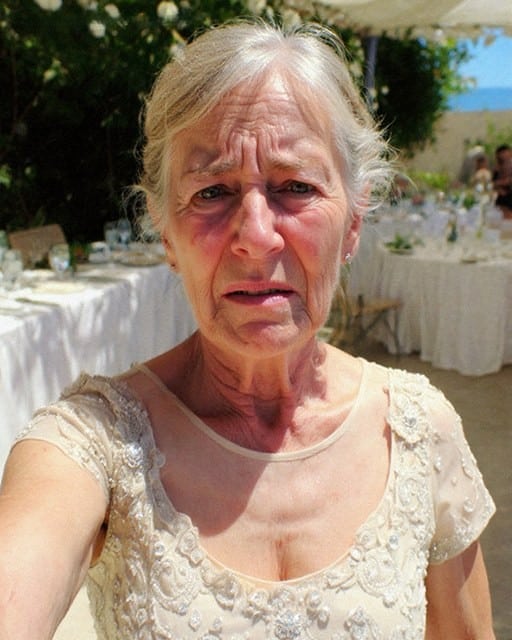Years later, she met Michael — kind, polite, and thoughtful. I was happy for her. But the first time I met his parents, I felt an unease I couldn’t quite name. His mother, Cynthia, looked me over with polite disapproval, while his father, Richard, asked pointed questions about my “career background” and “social connections.” They were the kind of people who measured worth in status and pedigree.
Still, I tried to be gracious. I baked pies for dinners, offered help with the wedding, and complimented their home. Every effort was met with cold smiles. Once, I overheard Cynthia say to a friend, “Single mothers love to exaggerate how hard life is.” I swallowed the hurt for Emily’s sake.
When wedding plans began, Emily told me Michael’s parents wanted to pay for most of it. I was grateful — I could only afford so much — but slowly, I realized I was being pushed out. My name disappeared from emails, the planner contacted Cynthia instead of me, and I wasn’t invited to the dress fitting or cake tasting. When I mentioned it, Emily brushed it off, saying, “Mom, they’re just excited.”
I told myself not to take it personally. I wanted peace.
On the morning of the wedding, I dressed in the blue gown I had saved for months to buy. I wanted to look proud, elegant, and happy. The vineyard where the ceremony took place was beautiful — golden hills, music in the air, and the smell of flowers everywhere. For a moment, I thought the day might still be perfect.
Then I found my seat.
It wasn’t near the front, where the bride’s family usually sits, but halfway back, among distant relatives I barely knew. I tried to brush it off — until I noticed the folded card on my plate.
In thick, black letters, it read: “Horrible and Fake Mom.”
My stomach dropped. I stared at it, hoping it was some kind of mistake. Then I looked up — and saw Cynthia watching me, the faintest smirk on her face. A few guests nearby noticed too. I could hear their whispers.
My hands trembled as I stood and walked out, holding the card. I didn’t care who saw me.
Emily was in the bridal suite, adjusting her veil. “Mom, what’s wrong?” she asked, startled.
I held out the card. “This. What is this supposed to mean?”
Her expression fell. “Where did you get that?”
“It was on my table,” I said, my voice shaking. “Did you know about this?”
She shook her head, horrified. “No! Of course not. I would never—”
Before she could finish, Cynthia appeared in the doorway, perfectly composed. “Oh, that?” she said casually. “It was a harmless little joke. Don’t take everything so seriously.”
“A joke?” I said, my anger rising. “Humiliating me in front of your guests — that’s funny to you?”
Cynthia’s tone turned cold. “Motherhood isn’t about playing the victim,” she said. “Anyone can work and pay bills. Not everyone can raise a lady.”
Emily’s face went pale. “Mother, how could you say that?” she whispered.
But Cynthia just shrugged and walked away.
I stood there, my heart breaking — not just from the insult, but from the realization that no matter how hard I tried, some people would always see me as less. Emily grabbed my hand, eyes full of tears. “Mom, please don’t let her ruin this day. You’re my mother. You always will be.”
So I sat through the ceremony, silent but proud. I watched my daughter walk down the aisle, glowing with love. And though I smiled, a part of me ached.
At the reception, I danced once with Emily, told her she looked beautiful, and quietly slipped away before dessert.
Days later, I still couldn’t stop thinking about that card. I wondered if I should’ve confronted Cynthia in front of everyone. But deep down, I knew that was what she wanted — to see me lose control.
A week later, Emily came to my door, eyes red from crying. “Mom, I’m so sorry,” she said. “I confronted them. They admitted they did it — said it was a ‘harmless way to keep you humble.’ I told them I’d never forgive them.”
I held her close and whispered, “It’s not your fault, sweetheart. You didn’t choose them.”
She pulled back, her voice steady. “But I chose you. And I always will.”
From that day on, something changed. Emily began setting boundaries with her in-laws. She made sure I was included in every celebration, every holiday, every part of her life. Slowly, the hurt began to fade.
I stopped thinking about the words on that card. Instead, I thought about everything I had overcome — the nights I cried alone, the years of struggle, and the daughter who turned out strong and loving despite it all.
They could call me whatever they wanted. But I knew who I was.
I was the mother who stayed.
The mother who worked when it hurt, who gave when there was nothing left to give, and who loved with everything she had.
And no cruel words — no matter how fancy the paper — could ever erase that truth.

